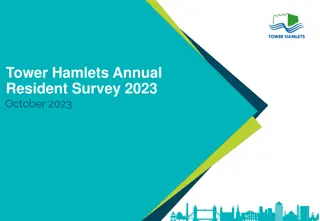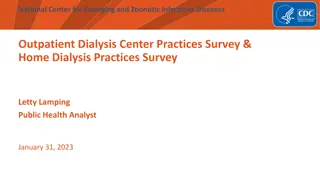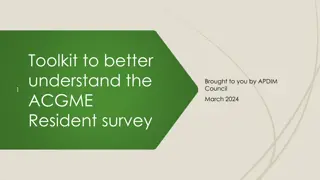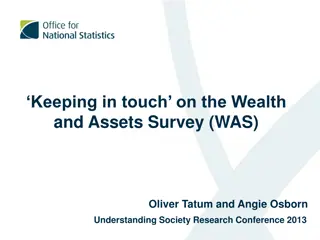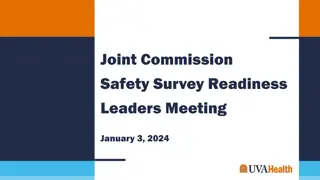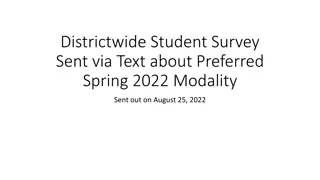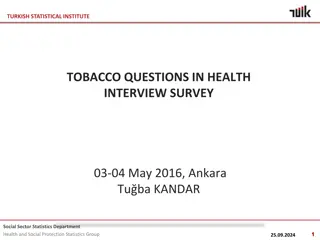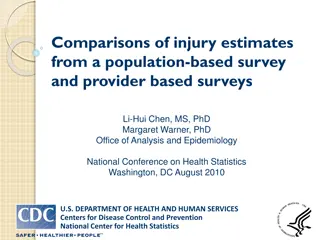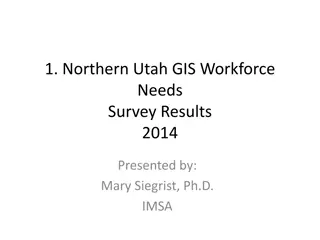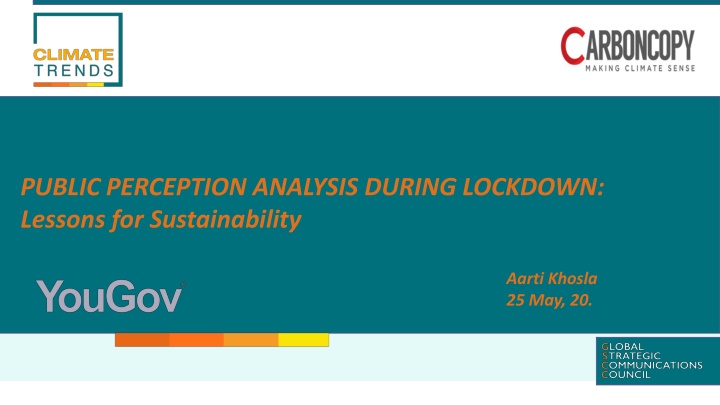
Unlocking Public Perception: Lessons for Sustainability Amid Lockdown
"Explore how people's perceptions have shifted during the lockdown, with a focus on cleaner cities, remote work preferences, and the impact of air pollution. Discover insights from a survey of over a thousand respondents across various cities in India."
Download Presentation

Please find below an Image/Link to download the presentation.
The content on the website is provided AS IS for your information and personal use only. It may not be sold, licensed, or shared on other websites without obtaining consent from the author. If you encounter any issues during the download, it is possible that the publisher has removed the file from their server.
You are allowed to download the files provided on this website for personal or commercial use, subject to the condition that they are used lawfully. All files are the property of their respective owners.
The content on the website is provided AS IS for your information and personal use only. It may not be sold, licensed, or shared on other websites without obtaining consent from the author.
E N D
Presentation Transcript
HOW WE CREATED A WINDOW OF OPPORTUNITY PUBLIC PERCEPTION ANALYSIS DURING LOCKDOWN: Lessons for Sustainability Aarti Khosla 25 May, 20.
HOW WE CREATED A WINDOW OF OPPORTUNITY How are people experiencing the lockdown? What are the big changes in sentiment, esp towards cleaner cities, less traffic and clean air? What do people feel about WFH?
1082 RESPONDENTS ACROSS 10 CITIES Cities Percentage Gender Percentage Males 60% Mumbai 10% Females 40% Delhi NCR 10% Age Chennai 10% 25 34 59% Bangalore 10% 35 44 32% Hyderabad 10% 45 55 10% Kolkata 10% SEC NCCS A 80% Jaipur 10% NCCS B 20% Ahmedabad 10% Employment status Pune 10% Employee 70% Surat 10% Self-employed 30% Total Base 1082 Total Base 1082
Survey Insights PRIORITIES- 6 out of 10 people enjoying the time they can spend with family. 9 out of 10 are saving time/money. CHANGE IN BEHAVIOUR- 7 out of 10 people want to continue working from home if that keeps the city and the air clean. PERCEPTIONS- 8 out of 10 people believe that WFH and less commute will keep the air cleaner. IMPACTS- 9 out of 10 people said air pollution impacts them personally( health) BENEFITS- both practical and environmental
SUMMARY While these movement restrictions have resulted in lesser pollution, cleaner air, people are also expecting the government to play their part in this maintenance with a majority (65%) concluding that the government should launch programs that ensure industries go pollution free. Half of the population identify lack of proper infrastructure at home, irregular routine schedule and reduction in team bonding as their top struggles. However, in spite of challenges, majority of them (70%) are willing to continue working from home post the lockdown is lifted. This willingness might be good news for employers who also see benefits of wfh 9 out of 10 think that their company has saved on operational expense during this time of increased wfh.
Indians believe air pollution to be a pervasive problem - more then 90% feel that it impacts them personally. Evidently, its not just a perception of impact 1 in 2 also say that they suffer from air pollution related health problems. Perceived Impact Of Air Pollution Air Pollution Related Health Problem 2% 1% Impact of Air pollution is more perceived in Delhi and with the older age group (35 to 44) 7% 48% 27% 53% 38% 12% 6% 4% 2% It affects me a lot It affects me somewhat It does not affect me a lot Respiratory Diabetes Cardiovascular diseases Cerebrovascular diseases Others None It does not affect me at all Don't know/can't say Base: 980 Base: 1082 QAP1. To what extent would you say air pollution affects you personally? QAP2. What air pollution related health problem do you suffer from? *Top 2 box analysis
Therefore, it is not surprising that Indians would be willing to take steps to maintain this fortuitous reduction in air pollution triggered by the COVID-19 induced lockdown. Interestingly, fewer people would be willing to take the route of public transport/shared mobility to do so - indicating people wants to maintain social distancing Measures To Maintain Reduction In Traffic, Pollution Levels Measures People Are Willing To Take Overall % I would consciously choose to walk for shorter distance 62% 60% I would demand to work from home as it will reduce congestion from roads and lead to cleaner air I would be willing to buy EVs (Electric vehicles) provided the charging infrastructure is in place across the country/in the states around me and prices are made affordable 49% I would use shared mobility options for cleaner air and less traffic 46% I would consider public transport options more often as it has environmental & health benefits 41% I would use public transport for short distance travel 37% Average 49% Base: 1082 QAP3. The COVID-19 pandemic has led to many people staying in. This has resulted in reduced traffic, lesser pollution and cleaner air. Keeping that in mind, which of the following, if any, would you do to maintain the same? Please select all options that apply.
People are also expecting the government to play their part in this maintenance with many believing that industries, historically the biggest polluters, should be encouraged to toe the line. Measures The Government Should Take To Maintain Reduction In Traffic, Pollution Levels Measures People Want The Government To Take Overall % Government should launch a time-bound program for industries who are harmful to environment (e.g. chemical industry, steel and cement industry etc.) to go pollution-free 65% Government should focus on restoring the ecological balance (protecting the forests & wildlife) in and around my city 64% Government should incentivize buying Electric Vehicles (EVs) 59% Government should prioritise funding for more electric public transport 57% Government should gradually open up the roads allowing only people to walk and cycle 57% Government should move from highly polluting coal power stations and diesel generators to solar, wind and hydropower 57% Average 60% Base: 1082 QAP4. The COVID-19 pandemic has led to many people staying in. This has resulted in reduced traffic, lesser pollution and cleaner air. Keeping that in mind, which of the following, if any, should the government do to maintain the same? Please select all options that apply.
Overall, people believe that going green via additional parks, eco-friendly transport and industries using clean energy, will have the highest impact on reducing levels of pollution. Measures To Reduce The Levels Of Pollution Addition of more trees/parks/green zones in cities 74% 21% 6% Green modes of transport 70% 24% 6% Industries that use renewable sources of energy 66% 28% 6% Strategic urban planning 57% 38% 5% Curb on mass exodus of population to certain cities 51% 42% 6% Taxation on ownership of multiple personal vehicles 48% 43% 9% Curb rampant construction of high-rise buildings 44% 46% 10% High impact Moderate impact Low Impact Base: 1082 At an overall level, which of the following, if any, do you think would have the most impact to reduce the levels of pollution?
And while going green is one way to reduce overall levels of pollution, 8 out of 10 feel that working from home will reduce air pollution in their city Environmental Benefit Of WFH Less air pollution in my city 81% Less use of polluting resources (petrol, diesel etc) 79% Average 72% Cleaner, liveable cities 69% Reduced greenhouse gas emissions responsible for climate change 67% Less energy usage and costs to my organization 65% Base: 1082 MQ2a. Thinking a little more about advantages, which among the following, if any, do you consider as environmental benefits to working from home? Please select that all apply.
WFH evidently creates a win-win situation practical and environmental benefits - more time with family and saving money as important as avoiding traffic Advantages Of WFH I can avoid crowds and traffic 67% I can spend more time with my family 64% I can avoid public/shared mobility transportation which have higher infection risks 64% I can save money (e.g. on traveling, ordering food for lunch etc.) 63% I can save time because there is no commuting 59% I enjoy the flexibility of my schedule and custom work environment 59% I can wear more comfortable clothes at home 59% Average 55% I can avoid processed, unhealthy, junk food and eat healthy home food 56% I can attend to my health, fitness regime and personal development needs 48% I don't need to wait for the weekend to finish some personal/household tasks 44% I can avoid long meetings and have shorter, more focused video calls 41% There are no office distractions and my productivity increases 39% Base: 1082 MQ2. According to you, what are the advantages of working from home? Please select that all apply.
Evidently continued WFH post lockdown is a viable option for many and most would like to do so to not only avoid traffic, but to enjoy the resultant clean air WFH the entire month! Willingness To Continue WFH Post Lockdown Reasons Of Continuing WFH Number Of Days Willing To WFH Males and people form Ahmedabad are more willing to continue WFH post lockdown I want to avoid crowds and traffic 76% 20% I am enjoying clean air due to less traffic and pollution 67% 43% 31% I enjoy the flexibility of my schedule 66% 69% I want to spend more time with my family 59% 37% I want to avoid commuting 58% 5 to 10 days in a month 11 to 15 days in a month Base: 742 Yes, I would still like to work from home 16 to 22 days in a month No, I would like to go to my office to work Also, people who are currently working in Technology sectors more willing to continue WFH as compared to people who are working in Banking & finance and health & Pharmaceutical sector Base: 1082 Base: 742 MQ4. Once this lockdown is lifted, would you still like to continue working from home? MQ5. What are some of the reasons because of which you would still like to continue working from home? MQ5a.. There are roughly 22 working days in a month, how many days do you think you can work from home and be equally or more productive than when working form office?
But while most people want to WFH, challenges exist reduced access to work infrastructure, irregular work routine, decreased team bonding top the list for people. This indicates that along with the practical, the emotional aspect of wellbeing is also on people s minds when it comes to WFH. Challenges Of WFH I am faced/am facing reduced access to work related infrastructure (e.g. fast internet, white-board, etc.) 50% I faced/am facing an irregular routine compared to my older 10am to 6pm schedule 49% I felt/feel a reduction in team bonding due to fewer conversations with co- workers 48% Average 44% I noticed delay in approvals/feedback from team members 43% I experienced/am experiencing reduced productivity (especially in the afternoon) 37% I was/am not able to avoid distractions from family 36% Base: 1082 MQ3. According to you, what were the challenges you experienced while working from home? Please select all that apply.
And even if some are not immediately ready to continue WFH, a nudge that involves communicating its resultant environmental benefits might influence people s decision. Continuing WFH In Benefit Of Environment Continuing WFH Post Lockdown Very Likely 29% Likely 35% Neutral 25% 69% 31% Not Likely 9% Base: 340 Very Unlikely 1% Base: 1082 Yes, I would still like to work from home No, I would like to go to my office to work MQ4. Once this lockdown is lifted, would you still like to continue working from home? MQ6. Many articles theorize that by opting to work from home, there are larger benefits to the society. The air gets cleaner, cities less congested and there is an overall reduction in pollution. In this situation how likely are you to want to work from office?
Employers also see benefits to WFH-9 out of 10 think that their company has saved on operational expense and they would encourage wfh if proper work infrastructure is in place, and productivity is maintained. Has Company Saved On Operational Expenses Since Employee Was Asked To WFH Situation In Which Company Will Encourage Employees To WFH If employees have a proper work set-up at home (e.g. fast internet, office stationery, printer etc) 89% 11% 89% If employee productivity wasn't affected 11% 10% If there is evidence that there are health benefits due to an overall reduction in air pollution in our environment 89% 11% 85% if it saved substantial man hours (by reduced commuting time) 15% 82% If there was substantial savings on operational expenses 18% 90% 78% If there was evidence that it won't impact team culture 22% Yes No Yes No Base: 248 MQ7. As an employer do you think your company saved on operational expenses since employees were asked to work from home? MQ8. The COVID-19 pandemic has made many industries re-design the way they work. One of the most common ways, has emerged to be work-from-home . From the following, in which situation would companies allow/encourage their employees to work from home?
SUMMARY PEOPLE ARE LIVING THROUGH PARALLEL CRISES AND ARE AWARE OF IT BRINGING THE WORLD TO A GRINDING HALT WILL BRING 7-8PC DROP IN ANNUAL EMISSIONS- TACKLING CLIMATE CHANGE NEEDS FIXING STRUCTURAL AND SYSTEMIC ISSUES. PUBLIC PERCEPTIONS HAVE CHANGED. IT WILL TAKE TIME TO CHANGE BEHAVIOUR. CHANGED PERCEPTION MUST BE SEIZED WISELY FOR A LONGER TERM VIEW OF REDUCING POLLUTION, EMISSIONS, AND STRESS ON OUR RESOURCES. ( POLICY MAKING) STIMULUS HAS BEEN ANNOUNCED- LET S NOT WASTE A CRISIS. MAKE IT GREEN!
Mumbai 95% of the respondents said they are impacted by air pollution 68% prefer walking shorter distance 65% would demand WFH as it may lead to clean air and less traffic 71% and 70% also want to WFH to avoid crowded places and shared mobility respectively 47% of the respondents willing to buy EVs if the charging infrastructure is in place along with affordability 69% of the total respondents from Mumbai are willing to work from home
Delhi 93% of the respondents said they are impacted by air pollution 61% prefer walking shorter distance 60% would demand WFH as it may lead to clean air and less traffic 65% and 64% also want to WFH to avoid crowded places and shared mobility respectively 56% of the respondents willing to buy EVs if the charging infrastructure is in place along with affordability 70% of the total respondents from Delhi are willing to work from home
Bangalore 92% of the respondents said they are impacted by air pollution 70% prefer walking shorter distance 59% would demand WFH as it may lead to clean air and less traffic 71% of respondents in Bangalore prefer to WFH as it would save money 59% of the respondents willing to buy EVs if the charging infrastructure is in place along with affordability 70% of the total respondents from Bangalore are willing to work from home
Hyderabad 91% of the respondents said they are impacted by air pollution 59% prefer walking shorter distance 57% would demand WFH as it may lead to clean air and less traffic 80% and 67% also want to WFH to avoid crowded places and shared mobility respectively 49% of the respondents willing to buy EVs if the charging infrastructure is in place along with affordability 68% of the total respondents from Hyderabad are willing to work from home
Chennai 90% of the respondents said they are impacted by air pollution 55% prefer walking shorter distance 60% would demand WFH as it may lead to clean air and less traffic 74% and 61% also want to WFH to avoid crowded places and shared mobility respectively 41% of the respondents willing to buy EVs if the charging infrastructure is in place along with affordability 70% of the total respondents from Chennai are willing to work from home
Kolkata 90% of the respondents said they are impacted by air pollution 60% prefer walking shorter distance 60% would demand WFH as it may lead to clean air and less traffic 71% and 72% also want to WFH to avoid crowded places and shared mobility respectively 41% of the respondents willing to buy EVs if the charging infrastructure is in place along with affordability 64% of the total respondents from Kolkata are willing to work from home
Jaipur 94% of the respondents said they are impacted by air pollution 62% prefer walking shorter distance 50% would demand WFH as it may lead to clean air and less traffic 50% of the respondents want to WFH to avoid crowded places and shared mobility respectively 62% of the respondents willing to buy EVs if the charging infrastructure is in place along with affordability (highest among 10 cities) 63% of the total respondents from Jaipur are willing to work from home
Ahmedabad 90% of the respondents said they are impacted by air pollution 62% prefer walking shorter distance 64% would demand WFH as it may lead to clean air and less traffic 64% and 63% also want to WFH to avoid crowded places and shared mobility respectively 43% of the respondents willing to buy EVs if the charging infrastructure is in place along with affordability 78% of the total respondents from Ahmedabad are willing to work from home (highest amongst the 10 cities)
Pune 93% of the respondents said they are impacted by air pollution 75% prefer walking shorter distance (highest amongst the 10 cities) 71% would demand WFH as it may lead to clean air and less traffic (highest amongst the 10 cities) 80% and 74% also want to WFH to avoid crowded places and shared mobility respectively (highest amongst 10 cities) 57% of the respondents willing to buy EVs if the charging infrastructure is in place along with affordability 69% of the total respondents from Ahmedabad are willing to work from home (highest amongst the 10 cities)
Surat 78% of the respondents said they are impacted by air pollution (lowest amongst 20 cities) 50% prefer walking shorter distance (highest amongst the 10 cities) 51% would demand WFH as it may lead to clean air and less traffic (highest amongst the 10 cities) 53% and 54% also want to WFH to avoid crowded places and shared mobility respectively (highest amongst 10 cities) 46% of the respondents willing to buy EVs if the charging infrastructure is in place along with affordability 64% of the total respondents from Ahmedabad are willing to work from home (highest amongst the 10 cities)
Perceived impact of air pollution by cities All Perceived Impact Of Air Pollution Mumbai Delhi Bangalore Hyderabad Chennai Kolkata Jaipur Ahmedabad Pune Surat Base 116 113 118 103 106 112 109 106 106 93 1082 It affects me a lot 59% 62% 57% 47% 48% 42% 69% 53% 52% 41% 53% It affects me somewhat 36% 30% 35% 44% 42% 48% 25% 37% 41% 37% 38% It does not affect me a lot 4% 2% 5% 6% 7% 6% 5% 8% 5% 18% 7% It does not affect me at all 1% 3% 2% 1% 2% 2% 0% 0% 1% 4% 2% Don't know/can't say 0% 3% 1% 2% 1% 2% 1% 2% 1% 0% 1% Base: 1082 QAP1. To what extent would you say air pollution affects you personally?
Measures people are willing to take by cities Ahmedaba d 106 All Measures People Are Willing To Take Mumbai Delhi Bangalore Hyderabad Chennai Kolkata Jaipur Pune Surat Base 116 113 118 103 106 112 109 106 93 1082 I would consciously choose to walk for shorter distance 68% 61% 70% 59% 55% 60% 62% 62% 75% 50% 62% I would demand to work from home as it will reduce congestion from roads and lead to cleaner air 65% 60% 59% 57% 60% 60% 50% 64% 71% 51% 60% I would be willing to buy EVs (Electric vehicles) provided the charging infrastructure is in place across the country/in the states around me and prices are made affordable 47% 56% 50% 49% 41% 41% 62% 43% 57% 46% 49% I would use shared mobility options for cleaner air and less traffic 45% 44% 42% 47% 42% 54% 45% 47% 50% 48% 46% I would consider public transport options more often as it has environmental & health benefits 52% 48% 40% 36% 32% 35% 49% 34% 40% 40% 41% I would use public transport for short distance travel 41% 34% 43% 41% 30% 31% 40% 37% 39% 29% 37% Base: 1082 QAP3. The COVID-19 pandemic has led to many people staying in. This has resulted in reduced traffic, lesser pollution and cleaner air. Keeping that in mind, which of the following, if any, would you do to maintain the same? Please select all options that apply.
Advantages of work from home by cities Ahmedaba d All Advantages Of WFH Mumbai Delhi Bangalore Hyderabad Chennai Kolkata Jaipur Pune Surat Base 116 113 118 103 106 112 109 106 106 93 1082 I can avoid crowds and traffic 70% 65% 67% 80% 74% 71% 50% 64% 80% 53% 67% I can spend more time with my family 63% 62% 63% 71% 71% 71% 47% 63% 69% 59% 64% I can avoid public/shared mobility transportation which have higher infection risks 71% 64% 67% 67% 61% 72% 50% 57% 74% 54% 64% I can save money (e.g. on traveling, ordering food for lunch etc) 66% 57% 71% 66% 63% 61% 54% 60% 74% 54% 63% I can save time because there is no commuting 66% 59% 60% 65% 59% 56% 50% 60% 71% 46% 59% I enjoy the flexibility of my schedule and custom work environment 62% 58% 68% 52% 57% 52% 50% 61% 71% 57% 59% I can wear more comfortable clothes at home 62% 63% 56% 60% 67% 62% 46% 60% 65% 48% 59% I can avoid processed, unhealthy, junk food and eat healthy home food 61% 55% 57% 60% 53% 63% 50% 50% 64% 52% 56% I can attend to my health, fitness regime and personal development needs 45% 53% 50% 45% 42% 55% 41% 47% 57% 42% 48% I don't need to wait for the weekend to finish some personal/household tasks 46% 45% 42% 50% 42% 44% 32% 48% 60% 35% 44% I can avoid long meetings and have shorter, more focused video calls 44% 41% 47% 40% 35% 44% 41% 38% 48% 34% 41% There are no office distractions and my productivity increases 41% 40% 45% 35% 32% 40% 34% 37% 49% 34% 39% Base: 1082 MQ2. According to you, what are the advantages of working from home? Please select that all apply.
Willingness to continue work from home post lockdown by cities All Willingness To Continue WFH Post Lockdown Mumbai Delhi Bangalore Hyderabad Chennai Kolkata Jaipur Ahmedabad Pune Surat Base 116 113 118 103 106 112 109 106 106 93 1082 Yes, I would still like to work from home 69% 70% 70% 68% 70% 64% 63% 78% 69% 64% 69% No, I would like to go to my office to work 31% 30% 30% 32% 30% 36% 37% 22% 31% 36% 31% Base: 1082 MQ4. Once this lockdown is lifted, would you still like to continue working from home?
Willingness to continue work from home post lockdown by industry Lifestyle and Fashion 13 Media and Entertainm ent 32 Health and Pharmaceu ticals 48 Banking and Finance 137 Willingness To Continue WFH Post Lockdown Beauty and Wellness EducationFMCG and Hospitality and F&B AutomotiveTravel and Aviation Technology Others All Retail Tourism Base 10 7 123 24 11 423 22 22 210 1082 Yes, I would still like to work from home 91% 64% 100% 69% 64% 82% 78% 57% 73% 61% 72% 63% 64% 69% No, I would like to go to my office to work 9% 36% 0% 31% 36% 18% 22% 43% 27% 39% 28% 37% 36% 31% Base: 1082 *Low base MQ4. Once this lockdown is lifted, would you still like to continue working from home?

